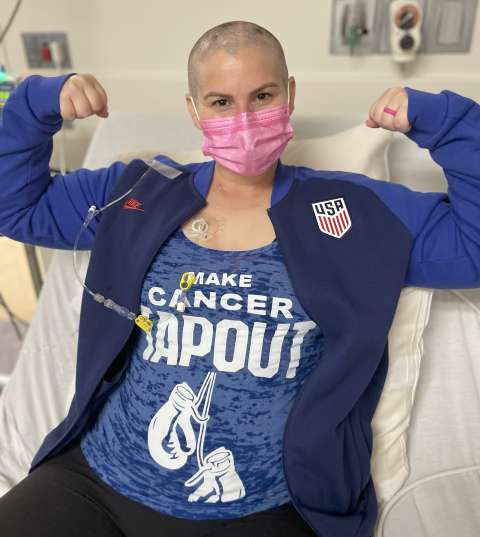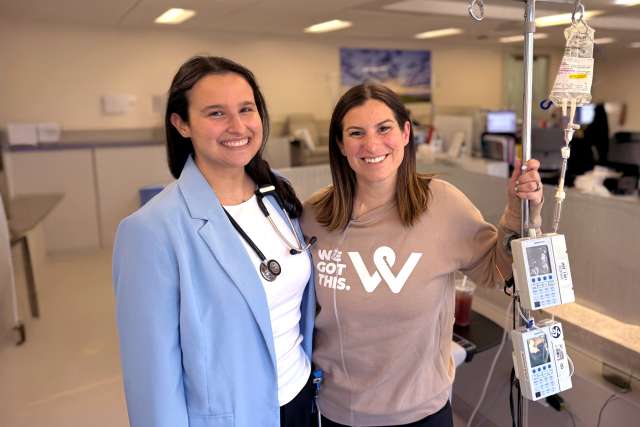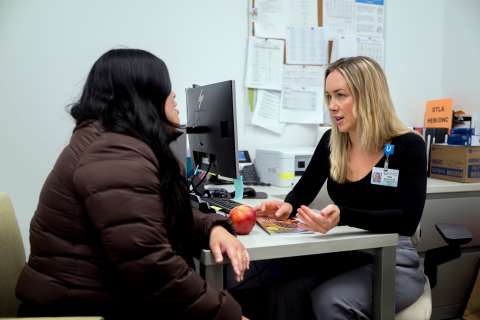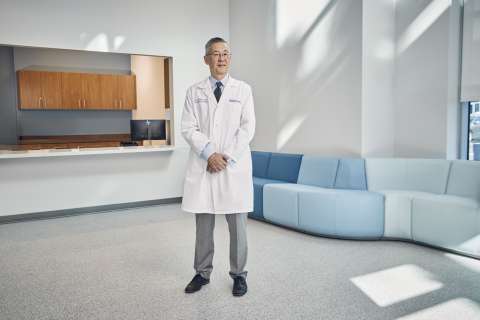Shortly after giving birth to her first daughter in 2020, Elissa Kalver couldn’t shake the feeling that something wasn’t right. She was grappling with persistent fatigue and aches that had no clear cause.
But every time she went to the doctor, tests and screenings came back normal. At one point, her doctors thought she might have an autoimmune disorder, but the tests were clean.
Then one morning, her husband, Eric, noticed a lump in her breast. She called her doctor and underwent a breast exam, followed by an ultrasound, mammogram and biopsy. But she never once thought she might have cancer.
“I really didn’t think it was cancer,” said Kalver. “I just assumed it was a cyst or a clogged duct from breastfeeding.”
The call from her doctor came a few days later, just before her daughter’s first birthday.
At just 34 years old, Kalver was diagnosed with HER2-positive metastatic breast cancer, an aggressive and fast-growing form of the disease. About 20% of women diagnosed with breast cancer have the HER2-positive subtype, which affects an estimated 200,000 to 250,000 women worldwide each year.
After Kalver received a PET scan, she and Eric were stunned to see so many different parts of the scan lit up. The cancer had already spread to her lymph nodes, liver and lower spine.
“Seeing more cancer in my liver than was in my breast, that was when I first started to understand what metastatic meant,” said Kalver. “I didn’t even know how to say the word before. I didn’t know what to think next.”
She began chemotherapy right away but sought a second opinion to ensure she was receiving the best possible care — a search that ultimately led her to UCLA Health.

Pioneering advances in HER2-positive breast cancer research and treatment
The treatment landscape for HER2-positive breast cancer has transformed dramatically over the past few decades, thanks in large part to groundbreaking work by researchers at the UCLA Health Jonsson Comprehensive Cancer Center.
Dennis Slamon, MD, PhD, director of clinical and translational research at the Jonsson Cancer Center and chief of hematology/oncology at the David Geffen School of Medicine at UCLA, helped lead the development of Herceptin, the first FDA-approved targeted therapy for HER2-positive breast cancer. The drug’s approval marked a turning point, significantly improving survival rates for patients with this subtype. Since then, UCLA Health has continued to lead clinical trials worldwide testing next-generation HER2-targeted therapies, which have expanded treatment options for both early-stage and metastatic disease, offering new hope to patients who previously had limited options.
Kalver knew UCLA Health was the place she needed to be.
After completing her initial treatment, Kalver turned to UCLA Health when doctors discovered the cancer had returned in her breast and brain.
She was enrolled in a clinical trial that combined a cocktail of chemotherapy with immunotherapy, which helped shrink her tumors and was successful at keeping the cancer at bay. However, the treatment was taking a toll on Kalver, affecting her quality of life. Her team quickly switched her to a different line of treatment.
“I was surprised how validating and comforting the team at UCLA was,” said Kalver. “I felt like my quality of life was valued, not just survival. And every time I’ve needed to pivot treatment, UCLA has given me clinical trial options. It’s been incredible.”
Under the direction of oncologist Marla Lipsyc-Sharf, MD, the UCLA team ensures patients receive personalized, evolving care that adapts to each person’s individual needs and prioritizes both effectiveness and well-being.
“Our goal is always to find the right balance between efficacy and quality of life,” said Dr. Lipsyc-Sharf, a Health Sciences Clinical Instructor in the division of hematology/oncology at UCLA Health. “Sometimes that means switching to a different regimen, not because the drug isn’t working, but because the patient has valuable priorities that would be better addressed with a different treatment.”
Turning struggle to support: The birth of WeGotThis.org
While undergoing treatment, Kalver decided she wasn’t going to let her diagnosis get the best of her. As a way of giving back, she started WeGotThis.org, the world's first nonprofit cancer gift registry.
The idea came about after many friends and family immediately ran to Kalver’s side after her diagnosis, asking what she needed or how they could help. The answer wasn’t always so easy, because Kalver didn’t always know what she needed.
“Friends and family often want to help loved ones facing cancer but aren’t always sure what to do,” Kalver said. “And I wanted to create an easier way for people to give and receive support during hard times. So, we thought what if there were something like a wedding or baby registry, but for all the things a cancer patient actually needs? When you have a baby registry, people aren’t guessing what kind of diapers or bottles you want, you tell them. I didn’t think it should be any different for those of us going through cancer treatment.”
The platform not only provides a place for patients to create a registry that they can share with others, but includes product recommendations and a resource directory to help ease the challenges of treatment.
“It shouldn’t feel like a burden to accept help from others,” Kalver said. “I think we all deserve to feel supported and seen during the hardest moments of our lives.”
While Kalver continues to grow the nonprofit, she also remains in active treatment, receiving immunotherapy treatments every three weeks. Though her condition may not be curable, medicine continues to advance thanks to innovative research and many are still living and thriving years longer than expected, noted Dr. Lipsyc-Sharf.
And Kalver hasn’t slowed down. She recently reached her five-year “cancerversary” and published her first book, “WE GOT THIS: How I Learned To Thrive With Terminal Cancer,” where she describes her cancer journey and what it really means to live a full life.
“I don’t know what the future holds,” Kalver said, “but I do know I want to spend my time making something beautiful out of something hard.”
Take the Next Step
Learn more about the UCLA Health Breast Cancer Program.





